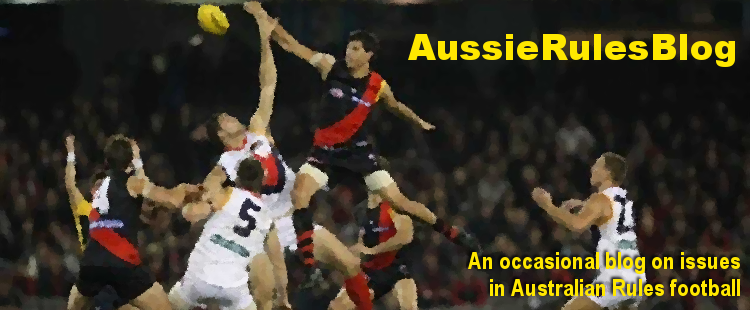Barcode ruckman Darren Jolley's gently worded demand in yesterday's Age that the AFL take more notice of players in framing the rules of the game is tantamount to the fox asking to be appointed supervisor of the henhouse.
It is only a few short days since former-coach Ken Judge related examples of coaches advocating for particular rules or interpretations on the (unspoken) basis of advantage for their team. Is there the slightest evidence that players, given the same opportunity, will take a loftier view? Of course not.
Longer-term followers of AussieRulesBlog will recall that we have taken the rules committee to task on many occasions. Notwithstanding those criticisms, the rules committee operate from an assumed position of disinterest -- that is, they are presumed to be taking a big picture view, a view of what is best for ALL stakeholders -- and that's a position the players would find very difficult to convince us they occupied.
That's not to say that Jolley hasn't raised some valid points. The AFL cannot argue his point that the rule changes of recent years have been designed to speed the game up, open it up and make it more free-flowing. In fact, recent changes to the times allowed for players to take free kicks or kick in after points verge on the ridiculous.
For what it's worth, there was a virtual hue and cry when the current three interchange and one substitute bench was introduced. Coaches and players were adamant in their condemnation of the change and predicted wholesale change to the way the game was played. Yet a scant three years later, when the stated aim of that flawed system was to reduce players' capacity to run and compete at the same level, interchange numbers are at the same level as previously, if not higher, and the substitute has become a tactical weapon when the team isn't forced to use it.
If there is no cap on interchange, coaches will continue to use it to elevate the impact of their key midfield runners and possession winners. There's no reason we couldn't see interchange numbers rise toward 200 per game. Already we see players like Dane Swan sprinting to the bench for a thirty second "rest" before sprinting back onto the ground. AussieRulesBlog has previously wondered whether the benefit of these changes is more mental than physical -- and that would tear a fairly large hole in Jolley's argument were it proven.
AussieRulesBlog is currently enjoying the hospitality of that football wasteland known as anywhere north of Brisbane. Starved of intelligent sport, we're enduring seemingly endless 'Super' rugby, (not-so-super?) rugby league and "the world game". We're happy to report that AFL stacks up pretty well. The disorganised mobile wrestling that is rugby defies understanding and seems to be an excuse for a wide-ranging game of stacks-on-the-mill. The simpler -- for the working classes -- rugby league features the anachronism of a scrum where players stand in a clearly desultory manner while the ball is fed into a predetermined set play at the back of the scrum. The non-feeding team don't even make an effort! In an under-20s game we watched this weekend, a team won the ball in a scrum against the feed, a feat the commentators remarked they hadn't seen for years!
And then there's the world game where Wayne Rooney can gull a referee into a free kick by hurdling OVER the legs of a tackling opponent and falling to the ground as though his achilles has been slashed. Oscar-worthy, and he's only one of the more visible exponents of this 'skill'.
To top it all off, all three codes feature endless intentional kicks out of play. This 'skill' was eradicated from Aussie Rules when God's dog was a pup. (Not that we're happy with the prevailing interpretations of the deliberate out of bounds rule in Aussie Rules)
Aussie Rules is in pretty fair shape compared to the competition. Rusted-on adherents aren't going to change their spots, and that's fair enough, but our game is well-placed to acquire new fans.
Should the players have more of a say in the way rules are changed or implemented? Almost certainly not. Are these mooted changes a danger to our game? Absolutely not. Take a chill pill, Darren, and enjoy your position as an on-field elder statesman of the game.
ends



